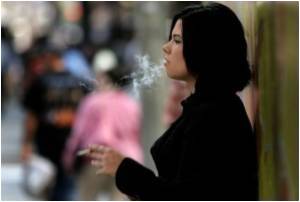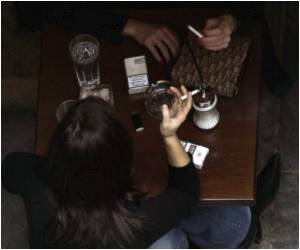
Spanish smokers will no longer be able to light up in bars, restaurants and cafes as new legislation takes effect that bans smoking in all enclosed public spaces.
It will also be illegal to smoke in children's playgrounds and on school or hospital grounds, according to the law, which received final approval from parliament on December 21.
Spain already has an anti-smoking law, in force since January 2006. It bans smoking in the workplace, on public transport and in shops, but is less restrictive than that in many European countries.
It allows owners of bars, restaurants and cafes to decide whether to allow smoking or not. Most, faced with a drop in business, naturally chose to permit their customers to light up.
The new measures take effect nearly seven years after Ireland became the first European country to outlaw smoking in public places, a move that unleashed a domino effect across Europe in favour of smoke-free bars and cafes.
Advertisement
The government has "imposed a total ban without regard to the figures that we have presented, or without an objective and rigorous study," said Jose Luis Guerra, vice president of the Spanish Hotel and Catering Association (FEHR).
Advertisement
He estimates the ban could spark a further 5.0-percent drop in sales in restaurants, about 10 percent in bars and 15 percent in night clubs -- just as the country is struggling to emerge from the crisis.
The Institute of Economic Studies estimates that 3.5 percent of jobs could be lost in the key sector as a result of the law.
The FEHR has proposed a system similar to that in France, where separate smoking areas with ventilators are permitted, Guerra said.
Dominic Brisby, the chairman of Spanish tobacco company Altadis, a unit of Britain's Imperial Tobacco, called it "one of the most radical anti-smoking laws in the world."
"It is even more extreme than in Ireland, as there they can smoke outdoors, and here it is prohibited in some situations," he told Spain's leading daily El Pais.
One smoker, Ignacio, a 42-year-old soldier who was puffing away in the crowded bar in Madrid, condemned it as "a backward step, especially considering the lifestyle we have here in Spain, the social life in places like this."
Health Minister Leire Pajin has backed the law as "a decisive step in the defence of the health of the Spanish people."
She said it could even be a boon for bars and restaurants as it would encourage non-smokers, especially those with families, to go out more. But she acknowledged it would "demand changes" which would "take time" as "habits cannot be changed in a day."
And some in the industry even agree.
"It will obviously hurt us financially," said Alfonso Castro, co-owner of the posh El Borbollon restaurant in central Madrid.
"But in a few months people will get used to it, as they did in Italy, Germany and England, and there won't be any problem."
A non-smoker himself, he said that 28 years working in a smoky environment had left him with problems with his blood circulation.
In Spain, tobacco causes the deaths of around 53,000 smokers per year, in addition to between 1,500 and 3,000 passive smokers, according to figures from the Socialist group in parliament.
The new law could even have one unforeseen social benefit, according to an opinion piece in El Pais.
Once the law takes effect "we will be seeing new knots of people at doorways exchanging complaints, cigarettes and phone numbers...," it said.
"After the cigarette, new couples return to drinks or work, to further enjoy a conversation started around a lighter's spurt of flame."
Source-AFP










